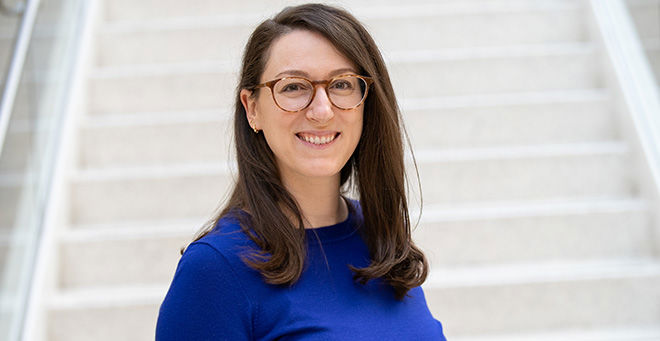
Transgender and gender-diverse people face more challenges than cisgender people in accessing treatment for eating disorders, and care providers aren’t always aware of the barriers, according to a paper published by recent Morningside Graduate School of Biomedical Sciences graduate and lead author Katarina A. Ferrucci, PhD’23.
The lack of treatment can have serious implications for mental and physical health, furthering health disparities among gender minorities, the authors wrote.
Kate L. Lapane, PhD, professor of population & quantitative health sciences; William M. Jesdale, PhD, assistant professor of population & quantitative health sciences; Catherine E. Dube, EdD, professor of population & quantitative health sciences; and research coordinator Emily McPhillips co-authored the paper, which appeared in Journal of Eating Disorders.
Dr. Ferrucci interviewed 19 licensed mental health clinicians in the United States who specialize in eating disorder treatment. Clinicians worked in a variety of practice settings, the majority in the South, and represented a range of gender and racial identities.
Self-reported history of eating disorders has been found to occur among 7.4 to 17 percent of transgender individuals generally in the U.S., Ferrucci noted, and among 4.3 percent of transgender individuals who have received gender-affirming medical intervention. This prevalence compares with 3.52 percent of cisgender sexual minority women, 2.06 percent of cisgender sexual minority men, 1.85 percent of cisgender heterosexual women and 0.55 percent of cisgender heterosexual men.
“One of the leading drivers of some eating disorders is feeling a lack of control in your life,” said Ferrucci. “I think for people who are transgender or who are gender diverse, in this socio-political atmosphere that is out of control for them, a lot of people are going to resort to this (disordered eating). There’s no predictability for them, and so this is the one stabilizing thing that may also be providing them with a sense of gender affirmation.”
The survey identified the following factors affecting access to care: stigmatization, family support, financial factors, gendered clinics, scarcity of gender-competent care and religious communities. Factors affecting care while in treatment included discrimination and microaggressions, provider lived experience and education, other patients and their parents, institutions of higher education that operate in state-funded or religious contexts, family-centered care, gender-centered care, and traditional therapeutic techniques, according to the survey.
One major barrier is that eating disorder treatment “is a super gendered health care space and it was really tailored to serve one particular demographic of people, typically wealthy, white, cisgender women,” Ferrucci explained.
But little has been reported on how these factors affect gender-diverse people’s care. One of the few other researchers who has studied gender diversity and eating disorder treatment that Ferrucci’s recent work was informed by is Sydney M. Hartman-Munick, MD’15, assistant professor of pediatrics.
“We wanted to figure out if what patients were reporting was on the radar of providers delivering that care, and also what they were being educated about,” Ferrucci said.
The survey of clinicians found that most providers were only in tune with a few key issues affecting transgender and gender-diverse patients generally and in their care.
Prior research has shown that gender-affirming medical care, which would align transgender and gender-diverse patients’ physical body with their social identity and expression, can significantly reduce or eliminate eating disorder symptoms brought on by gender-related distress, according to Ferrucci.
“There are more transgender and gender-diverse people flooding into the mental health system because they’re not getting the medical support they need,” said Ferrucci. “These findings highlight an urgent need for more comprehensive and widespread gender-focused education among mental health providers delivering eating disorder treatment.”
